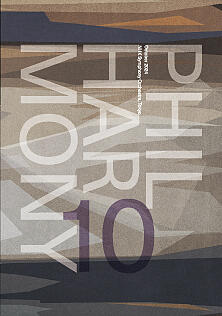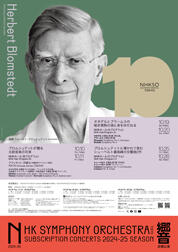- Home
- Concerts
- Subscription Concerts 2024-2025
- Program B
- No. 2019 Subscription (Program B)
No. 2019 Subscription (Program B)
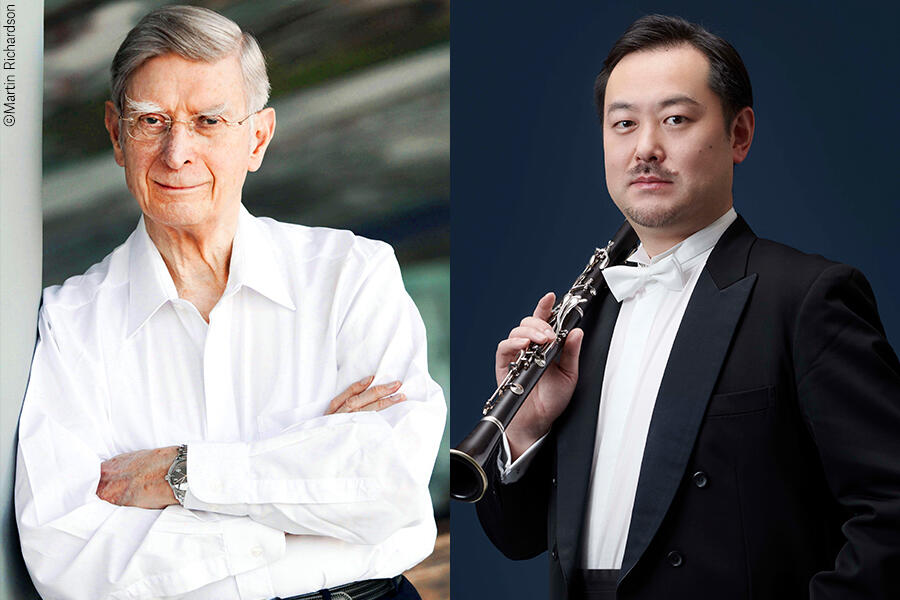
Program
Sibelius / 4 Legends, sym. poem―The Swan of Tuonela
The timeless pride of Finland, Jean Sibelius (1865–1957) left his double mark on music history, as an important symphonist following the pan-European tradition and as the establisher of the Finnish national identity in music. An early successful example of the latter is Four Legends from the Kalevala (also known as Lemminkäinen Suite after the eponymous hero), a set of four symphonic poems premiered in 1896. The Kalevala is Finland’s mythological epic which led a national awakening through the second half of the nineteenth century and thus paved the way for the country’s independence from Russian rule in 1917.
The Swan of Tuonela (completed in 1895, revised in 1897 & 1900) is the most popular of the cycle. Tuonela is, according to the first edition of the score, “the Hades of Finnish mythology” surrounded by “a large river of black water” on which “the swan of Tuonela glides majestically and sings.” Sibelius entrusted the role of this singing swan to the English horn: indeed, its pear-shaped bell, its long main body and its bocal (curved thin tube that the reed is attached to) remind us of a swan, whilst its plaintive tone fits the work’s mysterious, mournful setting well. Depicting the scene with a vivid imagination, Sibelius, an eminent violinist as well, displays great ability as an ingenious orchestrator: especially, his meticulous treatment of the strings – divided into thirteen parts at the beginning – produces a remarkable effect throughout the work.
[Kumiko Nishi]
Nielsen / Clarinet Concerto Op. 57
The same age as Sibelius, Carl Nielsen (1865–1931) is certainly one of the most essential Danish and even Nordic composers. However, he didn’t gain genuine international fame in his lifetime despite his catalogue distinguished both in quality and in quantity, including six unconventional, inventive, beautiful symphonies (premiered on his native soil between 1894 and 1925). He studied composition in Copenhagen under Gade (1817–1890) who also trained Grieg (1843–1907). While composing, Nielsen started his career as an orchestral violinist and later served as a conductor with the leading orchestras in the capital.
The Clarinet Concerto (1928) dates from Nielsen’s final years. His source of inspiration was the Copenhagen Wind Quintet who gave the premiere of his Quintet in 1922: impressed by the members, Nielsen wrote the Flute Concerto (1927) for its flutist and then another one for its clarinetist Aage Oxenvad who brilliantly premiered this technically demanding concerto in 1928. Regrettably, the next concerto was never completed as the composer passed away three years later. His compositional pace had already started to slow down in the early 1920s due to his failing health.
The Clarinet Concerto is written for a small-sized orchestra which unusually requires only a snare drum (instead of timpani) as percussion. This single-movement piece consists of four parts, having the slow Adagio and the scherzo-like ones in the middle. The final spirited part in march rhythm suddenly drops its speed towards the end to close the concerto in unexpected quietness: unpredictability is Nielsen’s specialty.
[Kumiko Nishi]
Berwald / Symphony No. 4 E-flat Major, Sinfonie naïve
Born to a musical family in Stockholm, Franz Adolf Berwald (1796–1868) is of the same generation as Rossini (1792–1868) and Schubert (1797–1828). The Swedish composer is thought to have started violin lessons at five with his father who was the Court Orchestra’s violinist. Treading in his father’s footsteps, the son joined the orchestra as a violinist in 1812. Berwald’s oldest existing compositions date from mid-1810s: he has since remained underrated as a composer particularly at home until 1867 – a year before his death at age 71 – when the Stockholm Conservatory appointed him professor of composition. For his living, he ran an orthopedic institute in Berlin and a glass factory in north Sweden, both with fair success.
Encouraged by the praise he got in 1842 for his symphonic poems in Vienna, Berwald wrote four symphonies in succession and gave them the French titles: No. 1 sérieuse (Serious) in G minor (1842), No. 2 capricieuse (Capricious) in D major (1842), No. 3 singulière (Singular/Unusual) in C major (1845) and No. 4 naïve (1845). Unfortunately, only No. 1 was heard publicly during his lifetime (incidentally, No. 2 was premiered in 1914 under the baton of Sibelius’ brother-in-law Armas Järnefelt). As for No. 4 – contemporary with Schumann’s Symphony No. 2 (1845–46) – , its premiere planned for 1848 in Paris was canceled due to the February Revolution. It was eventually first performed in 1878, ten years after Berwald’s death.
All the four movements of the Symphony naïve are in major keys. The first sonata movement begins with a brief repeated-note fanfare immediately before the cellos throw a grand arc of the first theme. In contrast, the second theme hops around. The middle movements – the serene D-major Adagio and the carefree B-flat-major Scherzo in A–B–A form – are performed seamlessly without pause. The vivacious, playful finale returns to the main key (E-flat major). Its opening repeated-note call is reminiscent of the first movement’s fanfare. This repeated-note element will be the driving force behind the surprise conclusion of this unique symphony.
[Kumiko Nishi]
[Encore]
Nielsen / Wind Quintet Op.43 - 2nd movement Menuet (excerpt)
(without Flute and Oboe)
Clarinet: Kei Ito
Bassoon: Kazusa Mizutani
Horn: Hitoshi Imai
Artists
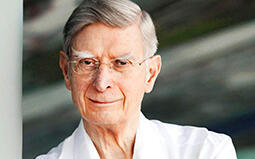 ConductorHerbert Blomstedt
ConductorHerbert Blomstedt
Herbert Blomstedt, who celebrated his 97th birthday in July 2024, is the world’s oldest conductor who is active on the podium. He was born in the United States in 1927 and moved to Sweden, his parents’ home country, where he studied at music institutions including the Royal Swedish Academy of Music. He made his professional debut in 1954 conducting the Stockholm Philharmonic Orchestra, and after pursuing further experience at northern European orchestras including the Swedish Radio Symphony Orchestra, has served as Principal Conductor of the Staatskapelle Dresden, Music Director of the San Francisco Symphony Orchestra, Music Director of NDR Sinfonieorchester (presently NDR Elbphilharmonie Orchester), Kapellmeister of the Gewandhausorchester Leipzig, to name a few. He has also guest-conducted the world’s most prestigious orchestras, including the Berliner Philharmoniker and Wiener Philharmoniker.
His collaboration with the NHK Symphony Orchestra dates back to 1981, and he was made Honorary Conductor in 1986. Since 2013, he has returned to the orchestra’s podium every year except 2020 and 2023, and was presented the title of Honorary Conductor Laureate in 2016. On this visit, he will present three programs which may illustrate his life as a conductor. The symphonies of Honegger and Brahms of program A will calmly resonate with Maestro Blomstedt, who was born the son of a minister and has led a devout Christian life in the Seventh-day Adventist Church. Program B is composed of Northern European works, his own roots, and Program C consists of Schubert’s two major symphonies, which will reach deep into the heart. The music he creates with his baton will remain deeply engraved in the hearts of audience members and resonate for a long time.
[Junko Shibatsuji, music critic]
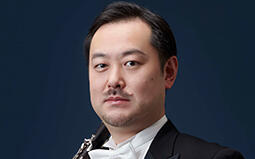 ClarinetKei Ito (Principal Clarinet, NHKSO)
ClarinetKei Ito (Principal Clarinet, NHKSO)
Kei Ito, born in Miyagi Prefecture, is a graduate of Tokyo University of the Arts. He has studied under Susumu Sengoku, Hiroyuki Hibino, Yusuke Noda, Masaharu Yamamoto, Hidemi Mikai and Yuji Murai to date, and has won 1st Prize at the 6th Japan Clarinet Compeitition in 2004. He also won a prize at the 74th Music Competition of Japan in 2006. He served as the soloist for Clarinet Concerto by Isang Yun at Tokyo University of the Arts’ concert titled Sozo-no Mori in 2014, and for Mozart’s Clarinet Concerto in the special concert to celebrate the 30th anniversary of His Majesty the Emperor’s accession to the throne in 2019. He has released many CDs including Rêveusement, an album of modern French works. He also teaches young musicians as a specially appointed associate professor at the Tokyo College of Music, and as a lecturer at Tokyo University of the Arts and Kunitachi College of Music.
After working with The Geidai Philharmonia Orchestra, Tokyo, and the Tokyo Metropolitan Symphony Orchestra, he was appointed Principal Clarinetist of the NHK Symphony Orchestra in 2011. He performed Septet for Wind Instruments by Hindemith in the NHK Symphony Chamber Music Concert in August 2022. The Clarinet Concerto he performs on this occasion is a concerto Nielsen wrote in his late years, and is a difficult work requiring a high technique. The audience can anticipate to hear an elegant yet impactful performance.
Download
Ticket
Program B
No. 2019 Subscription (Program B)
Suntory Hall
Google Map
Seating Chart
Single Tickets Release Date
Pre-sales for Subscribers:Wednesday, July 31, 2024
*about subscribers
Sale to General Public:Sunday, August 4, 2024
Price
| S | A | B | C | D | |
|---|---|---|---|---|---|
| Ordinary Ticket | 12,000 | 10,000 | 8,000 | 6,500 | 5,500 |
| Youth Ticket | 6,000 | 5,000 | 4,000 | 3,250 | 2,750 |
Seating chart Enlarge Print PDF
*tax included
*Subscribers receive a 10% discount (Available at NHKSO WEB Ticket and N-Kyo Guide)
*For wheelchair-accessible seats, please refer to the N-Kyo Guide
Youth Tickets
Youth Tickets are great options for those of 29 years old and younger
Subscription tickets
Release Date
ANNUAL SUBSCRIPTION TICKETS
Mon., July 15, 2024 10:00am
[For Subscribers: Sun., July 7, 2024 10:00am]
Where to buy
NHKSO WEB Ticket | Thursday, October 10 (In English / Seats not selectable)
NHKSO WEB Ticket | Friday, October 11 (In English / Seats not selectable)
NHKSO WEB Ticket (In Japanese only / Seats selectable)
N-Kyo Guide (Purchase by telephone only)
Broadcast
 NHK-FMNo. 2019 Subscription (Program B)
NHK-FMNo. 2019 Subscription (Program B)
Thursday, Oct 31, 2024 7:30PM - 9:10PM
Program:
Sibelius / 4 Legends, sym. poem―The Swan of Tuonela
Nielsen / Clarinet Concerto Op. 57
Berwald / Symphony No. 4 E-flat Major, Sinfonie naïve
Conductor:Herbert Blomstedt
Clarinet:Kei Ito (Principal Clarinet, NHKSO)
Recorded:October 10, 2024 Suntory Hall
*Repertoire, conductor, soloists and program order are subject to change without notice.
*Pre-school children are not allowed in the concert hall

